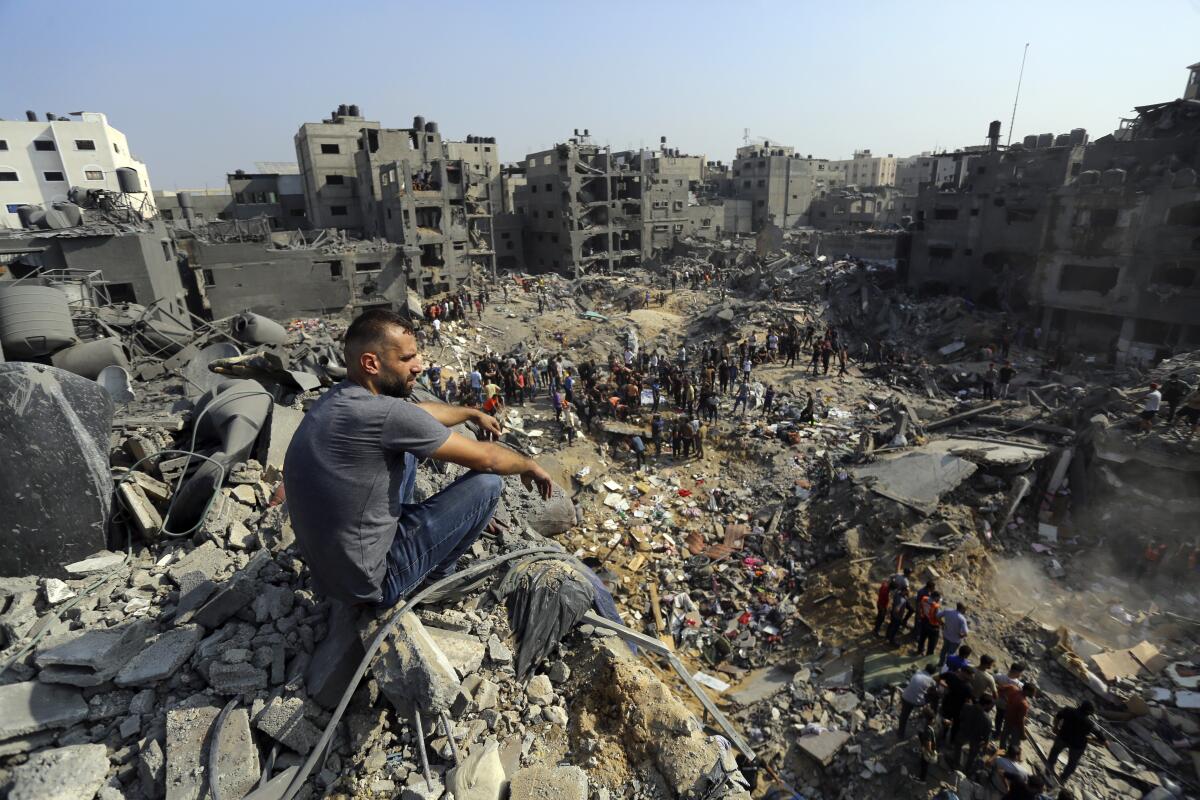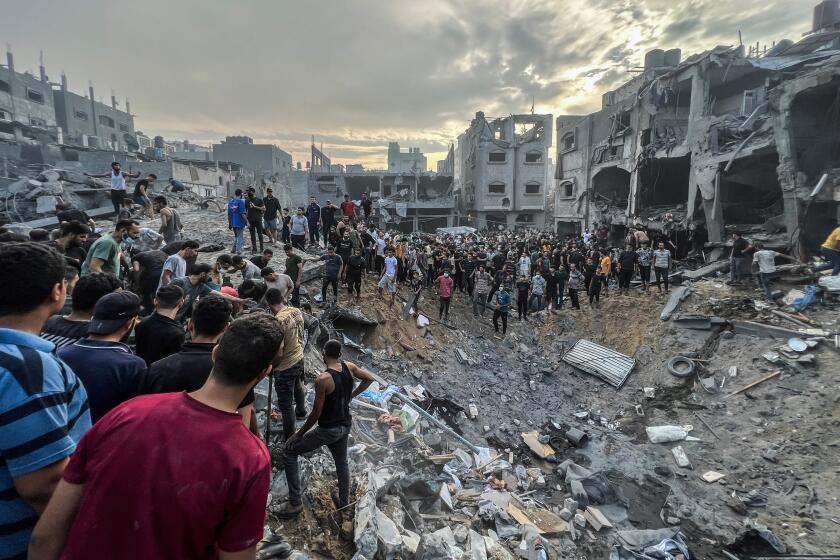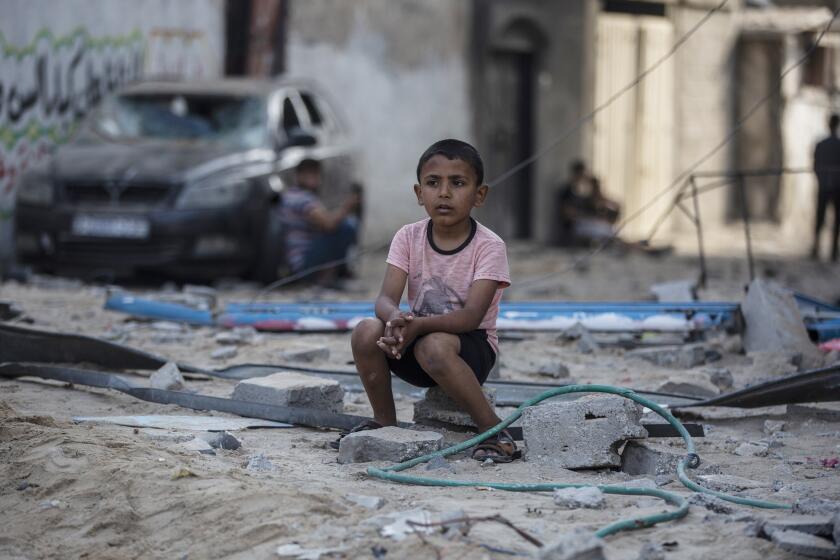Gaza’s devastation and Palestine’s future will require a new Marshall plan

- Share via
In the aftermath of World War II, President Truman and Secretary of State George C. Marshall confronted the devastation in Europe and realized that “an orderly and prosperous Europe requires the economic contributions of a stable and productive Germany.”
Early in 1948, the Truman administration submitted to Congress a proposal that would “promote world peace and the general welfare, national interest, and foreign policy of the United States” through a massive investment in war-torn Europe. This became known as the Marshall Plan, which provided over $13 billion (more than $150 billion in today’s dollars) and played a vital role in the political and economic rehabilitation of Europe, especially Germany.
Airstrikes flatten blocks of Gaza refugee camp, bringing rage, grief and a perilous new phase of war
Israel’s military says it killed a Hamas commander in devastating strikes in Jabaliya refugee camp in Gaza. Hospital chief describes ‘waterfall of casualties.’
Even in the midst of Israel’s devastating campaign in Gaza, which is a response to Hamas’ heinous attack on Oct. 7, it is not too early to consider the idea of a new Marshall Plan for the Middle East, focused largely on the long-term development of Palestine (and also on the need for reconstruction in decimated portions of southern Israel).
Over the years, well before this war, some have called for a Marshall Plan for the Palestinians. Now is exactly the time for forward-thinking policymakers to plan for the day after the fighting and bombing stops. This convulsion of violence impels a new boldness to break the cycle that has marked the more-than-hundred-year conflict between Arabs and Jews in historic Palestine.
Why? In the first instance, the aspirations of Palestinians for national self-determination and collective dignity have been deferred for far too long, since their forced displacement in the Nakba in 1948. The infrastructure provided by the Palestinian Authority in the West Bank and United Nations Relief and Works Agency in Gaza is not sufficient for a sustainable quality of life.
Israel struck the Jabaliya refugee camp in the Gaza Strip Tuesday. Palestinians have experienced a long cycle of displacement within and beyond Israel’s borders.
Palestinians deserve to have adequate dwellings, schools, hospitals, sanitation facilities and transportation systems — much of which was promised, but not delivered, in the Oslo peace process in the 1990s. Whenever the current Israel campaign ends, and my fervent hope is that it will be soon (with the return of all hostages), Gaza will have to be rebuilt completely to provide for its millions of residents.
This will require tens, perhaps hundreds, of billions of dollars, to elevate the quality of life of Palestinians from the current intolerable conditions to a level that can guarantee that parents will be able to provide their children with nourishment, education and hope for a better future. This is a task that can wait no longer.
Such an investment must be accompanied by a meaningful political horizon toward which Palestinians can look. The most plausible horizon may be the two-state solution, since Palestinians and Israeli Jews are now far less likely to want to live together in a single state.
Many, myself included, had long assumed that the two-state solution was dead, given the extent of Israeli settlement in what would become a state of Palestine. But it may now be the most viable idea today, especially if one considers a variation that has gained some currency recently: a confederation of two states with relatively open borders, the right of residency of members of one group in the state of the other, and some instruments of governance shared by Israel and Palestine. (In terms of infrastructural cooperation between Israelis and Palestinians, there is already a well-developed plan called “the Arc” produced 18 years ago by the Rand Corp. that contains a concrete blueprint for cooperation.)
The United States must assume the lead in providing economic and political empowerment for Palestinians — not alone, but rather with the European Union, Saudi Arabia, Egypt and the United Arab Emirates, among others. Some may see such a project as yet another manifestation of Western colonial imposition, but in fact it can be an important step toward the decolonization of Palestine.
Providing a major rehabilitation package to Palestinians offers them a tangible degree of hope to become a sovereign country, as well as a clear alternative to the destructive path of permanent armed struggle that Hamas advocates. At the same time, it builds on the scaffolding of the Abraham Accords, which point toward a future security alliance that allows for a new degree of political stability in the region.
Critics of a new Marshall Plan might ask: Doesn’t such an audacious step reward Hamas for its savage attack on Israeli civilians? Others will ask whether such a step absolves Israel of responsibility for the many thousands of people killed and the destruction of large portions of Gaza.
Admittedly, the Marshall Plan idea sidesteps the question of guilt and criminality. Rather than adopt a punitive legal approach, this new version of a Marshall Plan rests on the logic of a political solution that would bring about tangible benefits, but would require abundant external incentives to pull off. If achieved, it could provide the Palestinian people with the dignity and recognition as a nation that they deserve.
Should that goal be achieved, another long-standing objective could be closer to realization: guaranteeing Israel’s survival and security. Indeed, this approach could be far more effective than military campaigns that leave deep scars, both physical and psychic, upon Palestinians.
Stable coexistence between Palestinians and Israelis would redound to the benefit of the United States and its allies, which can focus anew on more pressing challenges in the international arena. Undoubtedly, the costs of such a plan would be high. But the failure to attend to root causes would consign Israelis and Palestinians to perpetual enmity and place the world in ever-graver danger.
David N. Myers teaches Jewish history at UCLA, where he serves as director of the Luskin Center for History and Policy and the Initiative to Study Hate.
More to Read
A cure for the common opinion
Get thought-provoking perspectives with our weekly newsletter.
You may occasionally receive promotional content from the Los Angeles Times.











